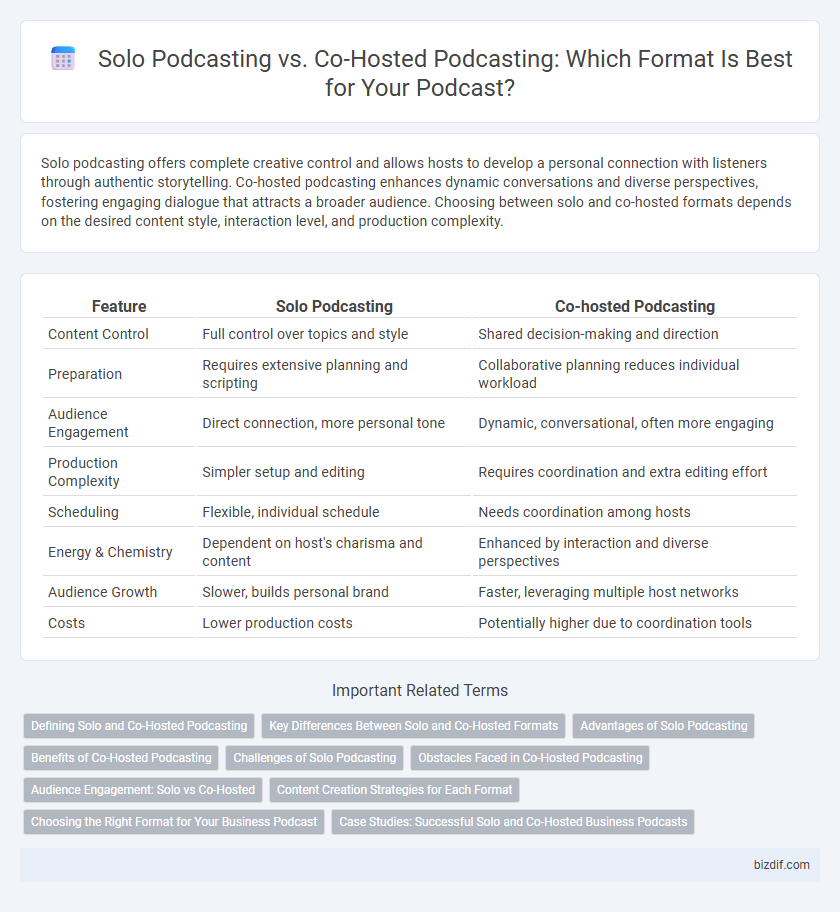Solo podcasting offers complete creative control and allows hosts to develop a personal connection with listeners through authentic storytelling. Co-hosted podcasting enhances dynamic conversations and diverse perspectives, fostering engaging dialogue that attracts a broader audience. Choosing between solo and co-hosted formats depends on the desired content style, interaction level, and production complexity.
Table of Comparison
| Feature | Solo Podcasting | Co-hosted Podcasting |
|---|---|---|
| Content Control | Full control over topics and style | Shared decision-making and direction |
| Preparation | Requires extensive planning and scripting | Collaborative planning reduces individual workload |
| Audience Engagement | Direct connection, more personal tone | Dynamic, conversational, often more engaging |
| Production Complexity | Simpler setup and editing | Requires coordination and extra editing effort |
| Scheduling | Flexible, individual schedule | Needs coordination among hosts |
| Energy & Chemistry | Dependent on host's charisma and content | Enhanced by interaction and diverse perspectives |
| Audience Growth | Slower, builds personal brand | Faster, leveraging multiple host networks |
| Costs | Lower production costs | Potentially higher due to coordination tools |
Defining Solo and Co-Hosted Podcasting
Solo podcasting involves a single host managing all aspects of the show, from content creation to delivery, offering a personal and focused narrative style. Co-hosted podcasting features two or more hosts who share responsibilities, creating dynamic interaction and diverse perspectives that enhance listener engagement. Both formats require strong communication skills but differ significantly in planning, chemistry, and audience connection strategies.
Key Differences Between Solo and Co-Hosted Formats
Solo podcasting offers complete creative control and a consistent personal voice, allowing hosts to build a direct connection with their audience. Co-hosted podcasting provides dynamic interactions, diverse perspectives, and natural conversational flow, enhancing listener engagement through chemistry and debate. Key differences include content delivery style, collaboration requirements, and audience connection dynamics, shaping the overall podcast experience.
Advantages of Solo Podcasting
Solo podcasting offers complete creative control, allowing hosts to shape content, tone, and pacing without compromise. It simplifies scheduling and production, eliminating the need to coordinate with others and reducing potential conflicts. This format fosters a direct and personal connection with the audience, enhancing engagement and authenticity.
Benefits of Co-Hosted Podcasting
Co-hosted podcasting enhances dynamic conversations through diverse perspectives, increasing audience engagement and listener retention. Sharing responsibilities between hosts streamlines content creation and reduces individual workload, allowing for more consistent episode releases. The chemistry between co-hosts fosters authenticity and relatability, often resulting in a stronger community and higher subscriber growth.
Challenges of Solo Podcasting
Solo podcasting presents challenges such as maintaining consistent content flow and engaging listeners without dynamic interactions. Podcasters must develop strong storytelling skills to avoid monotony and keep the audience interested throughout episodes. Technical responsibilities and editing also fall solely on the solo host, increasing workload and production time.
Obstacles Faced in Co-Hosted Podcasting
Co-hosted podcasting often encounters challenges such as scheduling conflicts, which can delay production and disrupt consistency. Differences in communication styles and creative visions may lead to disagreements, impacting the overall flow and quality of episodes. Balancing equal participation and managing technical responsibilities among co-hosts requires careful coordination to maintain audience engagement and podcast longevity.
Audience Engagement: Solo vs Co-Hosted
Solo podcasting offers a direct and intimate connection with the audience, allowing for a consistent personal voice and tailored content that fosters deep listener loyalty. Co-hosted podcasting enhances audience engagement through dynamic conversations, diverse perspectives, and natural banter, which can increase listener retention and create a community feel. Data shows co-hosted podcasts often experience higher average listening durations and social interaction rates compared to solo shows.
Content Creation Strategies for Each Format
Solo podcasting demands focused content creation strategies emphasizing personal expertise, clear narrative structure, and consistent pacing to maintain listener engagement. Co-hosted podcasting requires collaborative planning, dynamic interaction, and balanced dialogue to leverage diverse perspectives and enhance audience connection. Tailoring scripting, topic segmentation, and audience interaction techniques to each format maximizes content quality and listener retention.
Choosing the Right Format for Your Business Podcast
Solo podcasting offers complete creative control and fosters a direct connection with your audience, making it ideal for businesses aiming to establish a personal brand or provide expert insights. Co-hosted podcasting enhances dynamic conversations and diverse perspectives, which can boost listener engagement and broaden your reach through varied expertise. Selecting the right format depends on your business goals, target audience preferences, and the type of content that best showcases your brand's value.
Case Studies: Successful Solo and Co-Hosted Business Podcasts
Successful solo podcasts like GaryVee's "The GaryVee Audio Experience" demonstrate how individual branding and consistent, focused content can drive audience loyalty and expand entrepreneurial reach. Co-hosted podcasts such as "The MFCEO Project" by Andy Frisella leverage dynamic interactions and diverse perspectives, enhancing listener engagement and community building. Case studies reveal that while solo podcasts excel in personal storytelling and brand control, co-hosted formats thrive on chemistry and varied viewpoints to boost audience retention and growth.
Solo podcasting vs co-hosted podcasting Infographic

 bizdif.com
bizdif.com